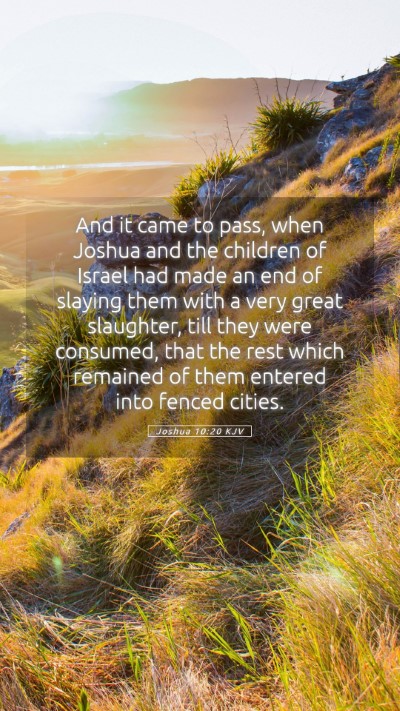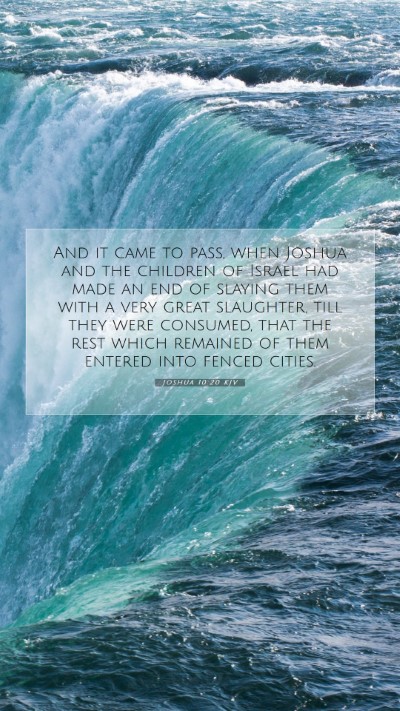Understanding Joshua 10:20
Joshua 10:20 states, "And it came to pass, when Joshua and the children of Israel had made an end of slaying them with a very great slaughter, till they were consumed, that the rest which remained of them entered into the fenced cities." This verse captures a pivotal moment in Israel's conquest of Canaan, emphasizing the totality of their victory and the consequences for their enemies.
Analysis of Verse Meaning
This passage signifies not just a physical battle but reflects deeper spiritual truths. The overwhelming defeat of Israel's enemies illustrates God’s support for His chosen people and the fulfillment of His promises to them.
Bible Verse Commentary
-
Matthew Henry's Commentary:
Henry emphasizes the importance of God's deliverance in this context, noting that the children of Israel, under Joshua's leadership, were instruments of God's judgment. This victory was not merely a military success but a manifestation of divine providence, demonstrating that those who oppose God will face dire consequences.
-
Albert Barnes' Notes:
Barnes suggests that this verse reflects the historical context of warfare in ancient Israel and points out the significance of the "fenced cities." The fortified towns served as places of refuge for those who remained, illustrating the desperation of the enemy. Barnes also highlights the notion that those who resist God's plans ultimately find themselves isolated and defeated.
-
Adam Clarke's Commentary:
Clarke expands on the nature of the "great slaughter," linking it to the broader themes of judgment and divine retribution. He points out that the total destruction of Israel's enemies underscores a significant moment in the history of Israel, revealing the seriousness of their covenant relationship with God.
Key Themes
Several key themes emerge from Joshua 10:20:
- Divine Support: The passage illustrates the assurance of divine support for those aligned with God’s purposes.
- Judgment: The verse serves as a stark reminder of the judgment that comes to those who oppose God.
- Fulfillment of God's Promises: It underscores the fulfillment of God's promises to the Israelites regarding the land they were to inherit.
Cross References
This verse relates to various other Scripture passages that illuminate its meaning:
- Deuteronomy 7:16: Discusses God's command for Israel to destroy the nations they conquer.
- Joshua 10:11: Describes God’s intervention during the battle as He rains down hailstones upon the enemies.
- Romans 8:31: Emphasizes that if God is for us, who can be against us?
Application of Learnings
For modern readers, Joshua 10:20 serves as a powerful reminder of the importance of faithfulness to God and the consequences of rebellion against divine authority. This passage can invite reflection on personal commitment to God’s will and the seriousness of His covenant, encouraging believers to trust in divine provision during conflicts.
Bible Study Insights
When reflecting on this verse during bible study groups, consider the following:
- Discuss the concept of divine justice: What does this passage teach us about God's justice and our responsibility in a covenant relationship with Him?
- Cultural and historical context: How does understanding ancient warfare and societal norms enhance our interpretation?
- Personal application: In what ways can we apply the lessons from Joshua's victory in our daily lives, especially in facing challenges or opposition?
Online Bible Study Considerations
In an online Bible study, one could explore various bible study tools like commentaries and lexicons to dive deeper into the language and cultural implications of the text. Group discussions can facilitate diverse insights into this historical narrative, offering a comprehensive understanding.
Conclusion
In conclusion, Joshua 10:20 offers rich insights into God’s character and His dealings with humanity. Through diligent bible verse interpretation, particularly in the context of victory and divine judgment, one can gain a more profound understanding of Scripture, which is crucial for anyone seeking meaningful connections with biblical texts.


